🚀 Introduction: Why Consensus Mechanisms Matter
Listen up — in the world of blockchain, consensus isn’t just some nerdy buzzword. It’s the bloodline, the engine, the goddamn heartbeat that keeps the whole decentralised machine alive. Without it, your blockchain is nothing more than a glorified Excel sheet floating in cyberspace.

We’ve seen Proof of Work (PoW) — the brute-force, energy-burning monster that powers Bitcoin. We’ve seen Proof of Stake (PoS) — the rich-get-richer model that Ethereum’s now riding. But here comes another player into the ring: Proof of Elapsed Time (PoET).
Developed by Intel in 2016, PoET flips the script. It’s not about solving math puzzles or staking millions of coins — it’s about waiting smartly, fairly, and efficiently. Sounds weird? Stick with me.
🎰 What is Proof of Elapsed Time (PoET)?
PoET is a blockchain consensus mechanism designed for permissioned blockchains. Translation? It’s not for wild, open-to-anyone crypto jungles like Bitcoin, but for controlled environments where membership is vetted.
Instead of competing to solve puzzles like in PoW, nodes in a PoET network enter a random lottery of wait times. Each node is assigned a random timer. Whoever’s timer runs out first gets to create the next block.
It’s like a digital version of “who can hold their breath the longest” — except instead of suffocating miners, PoET nodes just sleep. Efficient, fair, elegant.
🧩 How PoET Works Under the Hood
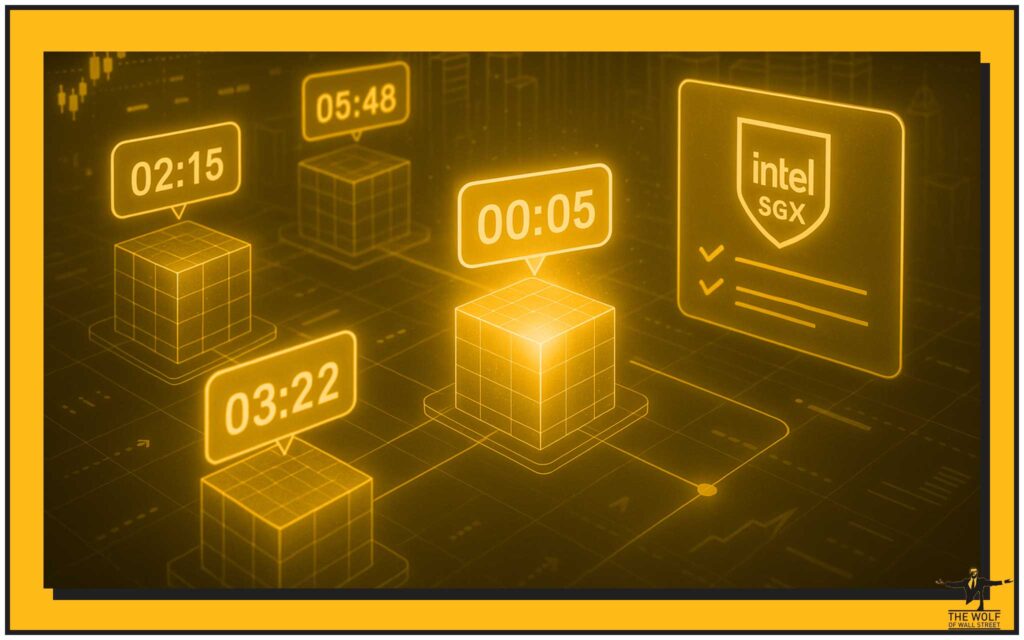
Here’s the play-by-play:
- Each node asks a Trusted Execution Environment (TEE) — like Intel’s SGX — for a random wait time.
- The node “goes to sleep” for that exact duration.
- The node with the shortest wait time wakes first and wins the right to create the block.
- The TEE guarantees that no one can cheat the system by faking a shorter timer.
It’s like a digital casino run by a dealer you can’t bribe — fairness is built into the hardware itself.
⚡ PoET vs Proof of Work (PoW) – The Showdown
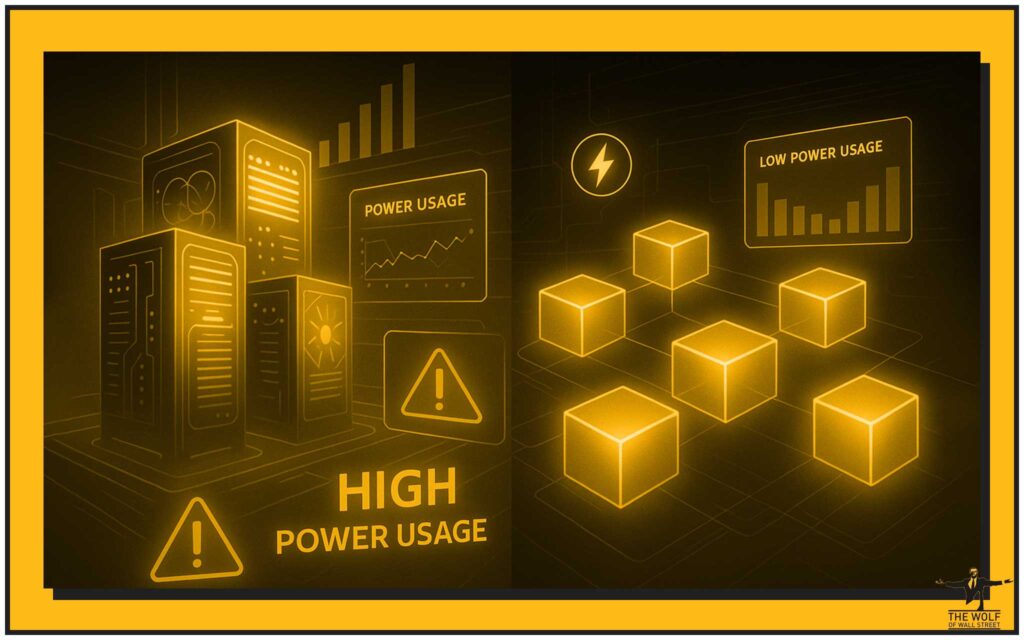
Let’s pit them head-to-head:
- PoW (Proof of Work): Every miner burns electricity solving cryptographic puzzles. Wasteful, competitive, energy-hungry.
- PoET (Proof of Elapsed Time): Nodes wait silently, sipping power like a Tesla on eco-mode, until one wins the lottery.
The difference? Massive efficiency gains. Bitcoin mining eats more electricity than some countries. PoET, by contrast, barely taps the power grid.
👉 For another consensus hybrid worth knowing, check out Proof of Activity.
🏗️ PoET in Action: Hyperledger Sawtooth

PoET isn’t just theory. It’s been battle-tested in Hyperledger Sawtooth, an enterprise blockchain platform backed by Intel, IBM, and the Linux Foundation.
Why Sawtooth? Because enterprises need a blockchain that’s:
- Scalable
- Efficient
- Fair
- Business-friendly
PoET gives them all that without needing mining farms the size of football fields.
👉 To explore scaling approaches, check out Layer 1 and Layer 2 solutions.
🎯 Key Features of PoET You Need to Know
- Fair Lottery System: Every node gets an equal chance to create blocks.
- Trusted Hardware: Intel SGX ensures no cheating.
- Energy Efficiency: Forget about burning megawatts — PoET is eco-friendly.
- Low Hardware Barriers: You don’t need specialised rigs; a standard server is enough.
💡 Advantages of PoET
PoET isn’t just fair and green; it’s practical for enterprises. Here’s why:
- Scalability: More nodes, same smooth process.
- Energy Savings: Hugely more efficient than PoW.
- Predictability: Consistent block timing makes it business-friendly.
- Accessibility: No need for millions in mining hardware.
⚠️ Limitations and Challenges of PoET
But let’s cut the BS — PoET isn’t perfect. Here are the cracks in the armour:
- Intel Reliance: If you don’t trust Intel, you don’t trust PoET.
- Permissioned Only: Not designed for open, permissionless blockchains like Bitcoin.
- No Built-in Incentives: Unlike miners in PoW, PoET participants don’t get juicy block rewards.
- Hardware Vulnerabilities: Trusted Execution Environments (TEE) are not invincible — side-channel attacks can expose weaknesses.
👉 For security considerations, see our Crypto AML compliance guide.
🔒 Security Considerations
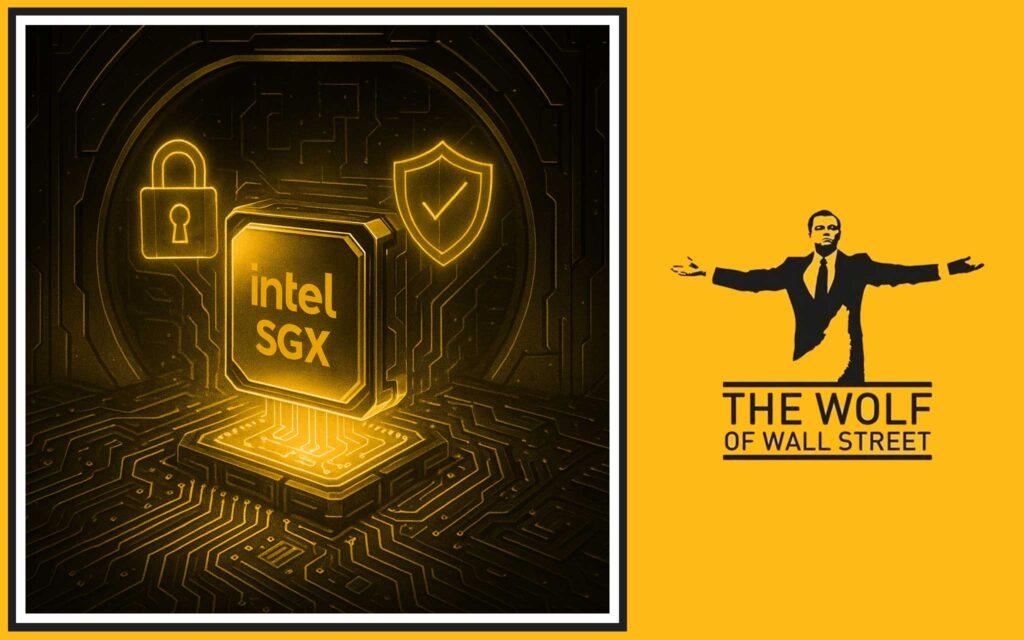
Security is where things get tricky. With PoW, the trust is in mathematical proof. With PoET, trust is shifted to hardware manufacturers.
If Intel’s SGX tech is ever compromised, the whole system could be at risk. And while Intel has patched vulnerabilities before, that reliance makes decentralisation purists nervous.
🌍 Practical Applications of PoET

So where does PoET shine? In enterprise blockchains — where you don’t want rogue actors but need efficiency:
- Supply chain tracking (e.g., food safety, manufacturing).
- Private financial ledgers for auditing.
- Consortium data-sharing between trusted businesses.
📉 Why No Major Cryptocurrency Runs on PoET
Here’s the kicker: no big-name crypto project runs on PoET. Why?
- Public blockchains need trustless decentralisation — PoET demands trust in hardware vendors.
- No tokenomics or mining rewards make it less appealing to crypto investors.
- Vulnerabilities in TEE tech make public adoption risky.
PoET is an enterprise star, but a public crypto outsider.
📊 PoET vs Other Consensus Mechanisms
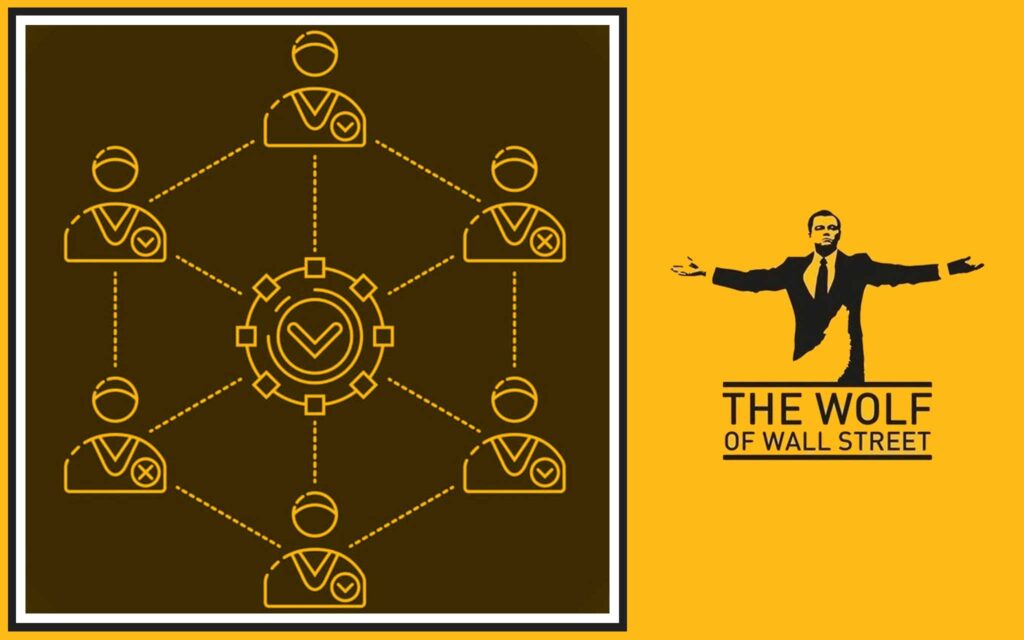
Let’s line up the competition:
- PoET vs PoS (Proof of Stake): PoS relies on financial skin in the game; PoET relies on fair hardware lotteries.
- PoET vs PoA (Proof of Authority): Both need trust, but PoET hides authority behind randomness.
- PoET vs PBFT: PoET scales better but still isn’t as trustless as PoW.
🏢 Business Use Cases: Where PoET Shines
- Manufacturing Traceability: Track components from factory to consumer.
- Financial Compliance: Private ledgers that regulators can trust.
- Data Consortia: Share records without worrying about manipulation.
🔮 Future of PoET: What’s Next?

Can PoET ever break into public blockchains? Possibly — if TEE technology evolves and decentralisation purists soften.
Intel and Hyperledger continue to refine PoET. But for now, its destiny looks more enterprise than crypto-anarchist.
🧠 Expert Insights & Criticisms

Experts love PoET’s efficiency but slam its dependency on Intel. Hardcore Bitcoiners argue: “If you need to trust a corporation, you’re not decentralised.” And they’re not wrong.
But enterprises don’t care about ideology — they care about performance and compliance. That’s why PoET may dominate permissioned ledgers even if it never touches public cryptos.
✅ Summary Table – PoET at a Glance
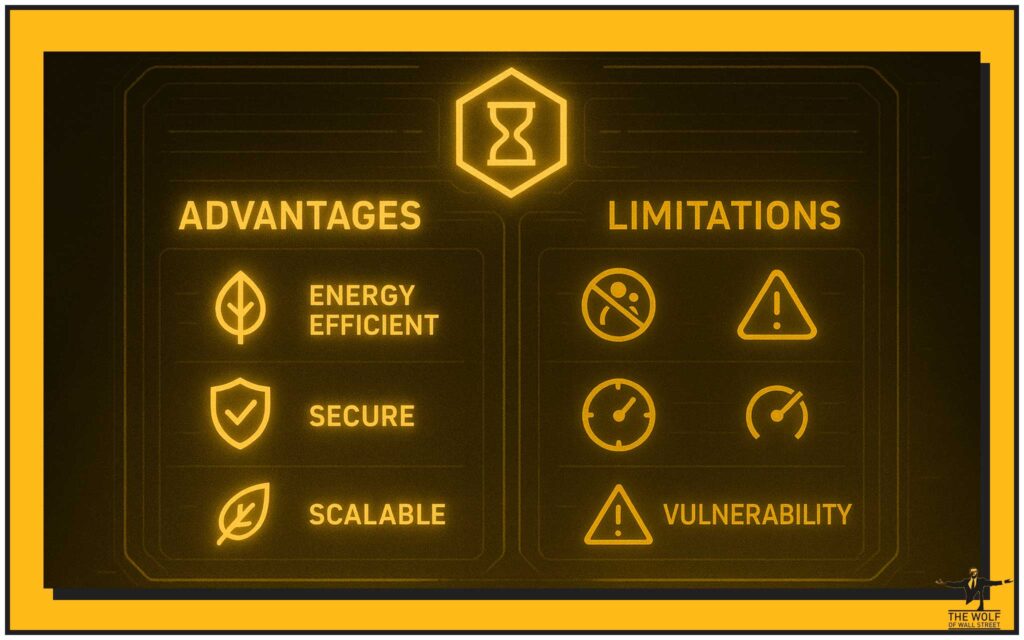
| Aspect | Key Highlights |
|---|---|
| What is PoET? | Intel’s consensus algorithm using random wait times in permissioned networks. |
| Key Features | Energy-efficient, fair lottery, trusted hardware, low costs. |
| How It Works | Nodes request random wait time → shortest wins block creation. |
| Vs PoW | PoW = energy burn, PoET = energy saving. |
| Adoption | Implemented in Hyperledger Sawtooth (enterprise only). |
| Advantages | Scalable, efficient, fair, predictable. |
| Limitations | Intel dependency, TEE risks, no incentives, permissioned only. |
| Best Use Cases | Supply chains, finance, enterprise blockchains. |
📚 FAQs – Quickfire Knowledge
1. Is PoET better than PoW for the environment?
Yes — PoET barely uses electricity compared to PoW’s insane energy drain.
2. Why doesn’t Bitcoin use PoET?
Because Bitcoin is public, permissionless, and doesn’t want to depend on Intel.
3. Can PoET work on public blockchains?
In theory, yes. In practice, not yet — hardware trust issues block adoption.
4. What’s the role of Intel SGX in PoET?
It ensures fairness and randomness by verifying wait times.
5. Where can I learn more about consensus mechanisms?
Start with our Research crypto opportunities guide.
🔑 Conclusion – Is PoET the Future or a Side Player?
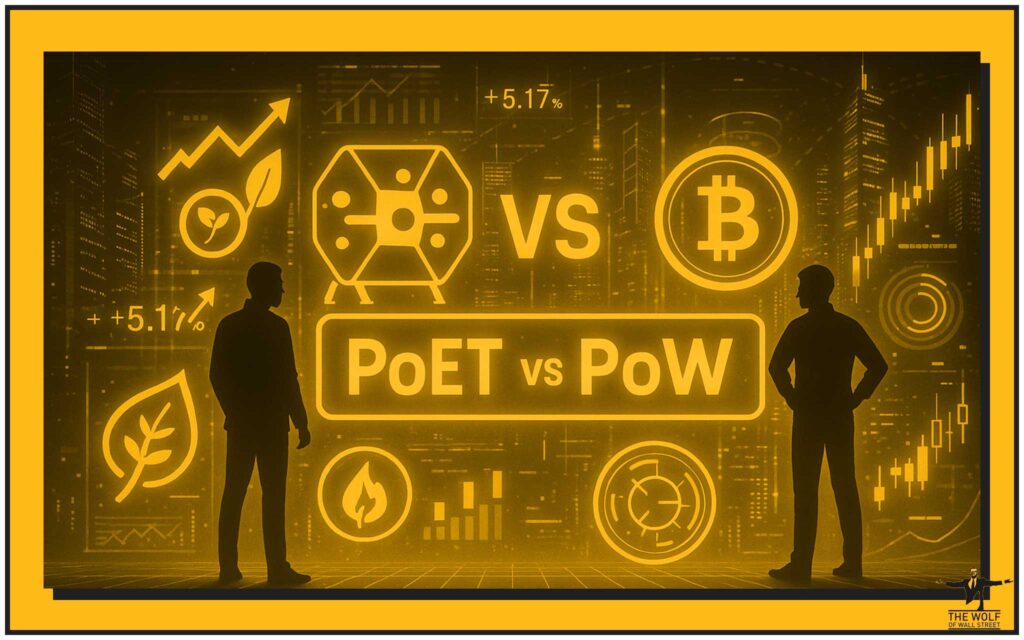
Here’s the truth: PoET is not here to replace Bitcoin or Ethereum. It’s here to dominate a different battlefield — enterprise blockchains where efficiency, fairness, and predictability trump ideology.
If you’re in the public crypto game, PoET may look like a curiosity. But if you’re an enterprise looking to streamline operations, cut costs, and build trust? PoET might just be your golden ticket.
The Wolf Of Wall Street crypto trading community offers a comprehensive platform for navigating the volatile cryptocurrency market. Here’s what you gain:

- Exclusive VIP Signals: Proprietary signals designed to maximise profits.
- Expert Market Analysis: Insights from seasoned traders.
- Private Community: Over 100,000 members exchanging strategies.
- Essential Trading Tools: Volume calculators, resources, and more.
- 24/7 Support: Always-on assistance from the team.
👉 Empower your crypto trading journey:
- Visit The Wolf Of Wall Street Service
- Join our Telegram community
- Unlock your potential to profit in the crypto market with The Wolf Of Wall Street



